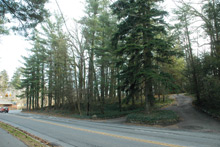UNC Asheville has acquired 10 acres of tree-studded land at the corner of W.T. Weaver Boulevard and Merrimon Avenue, the school announced Dec. 31. Between them, the Weaver and Rhoades families have owned the old homestead for more than 100 years.

Although the property was appraised at $6 million, the university paid $3 million—$2 million in state funds set aside for buying property and $1 million from UNCA’s trust funds. The remaining $3 million constitutes a gift to the university—one of the largest the school has ever received, according to a news release.
“This provides us with an unparalleled opportunity to preserve this cherished homestead that is so much a part of our rich heritage in Asheville,” Chancellor Anne Ponder said in the statement. “It is a particular honor to carry on the wishes of the Rhoades family in preserving a green corridor along Merrimon Avenue and W.T. Weaver Boulevard for the community for generations to come.”
The school has been talking with the Rhoades family about the parcel for decades, UNCA spokesperson Merianne Epstein told Xpress. Adjacent to the campus, it features a number of grand trees and a green periphery that the university wants to preserve. Although there are no immediate plans to develop the land, it might one day be used as an eco-village for students and faculty, said Epstein.
Verne Rhoades Sr., for whom UNCA’s Rhoades Hall is named, was one of Western North Carolina’s first scientific foresters, according to the news release. He played important roles in the creation of both Pisgah National Forest and the Great Smoky Mountains National Park, and he was well known in Asheville as a visionary civic and business leader.
“We had many calls from developers interested in the property because of its frontage on Merrimon Avenue, but we didn’t want to go that route,” said Sally Rhoades, the wife of the late Verne Rhoades Jr., in the press release. “For the past 20 years, we’ve had a strong interest in the property going to UNC Asheville, because our feelings about conservation and community responsibility are values shared by the university.”
W.T. Weaver, for whom Weaver Boulevard is named, is considered the father of Asheville’s electrical-power system. He established the W.T. Weaver Electric Co. in the early 1900s and built hydro-electric plants on the French Broad River in Buncombe and Madison counties. The firm became N.C. Electric Co., then Asheville Power & Light, and eventually Carolina Power & Light Co., according to Weaver’s obituary in the Asheville Citizen. Weaver died in November 1916.




Before you comment
The comments section is here to provide a platform for civil dialogue on the issues we face together as a local community. Xpress is committed to offering this platform for all voices, but when the tone of the discussion gets nasty or strays off topic, we believe many people choose not to participate. Xpress editors are determined to moderate comments to ensure a constructive interchange is maintained. All comments judged not to be in keeping with the spirit of civil discourse will be removed and repeat violators will be banned. See here for our terms of service. Thank you for being part of this effort to promote respectful discussion.